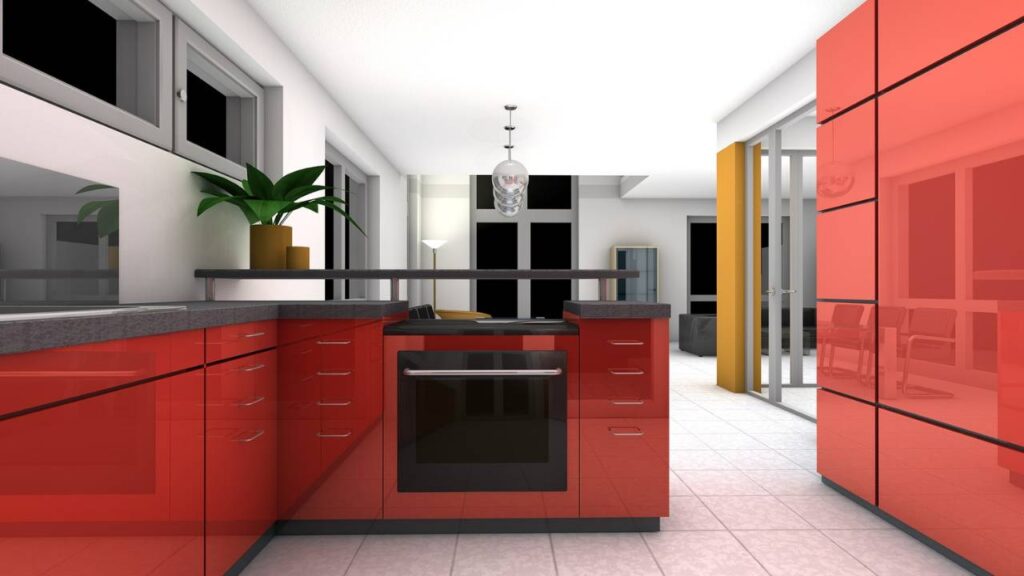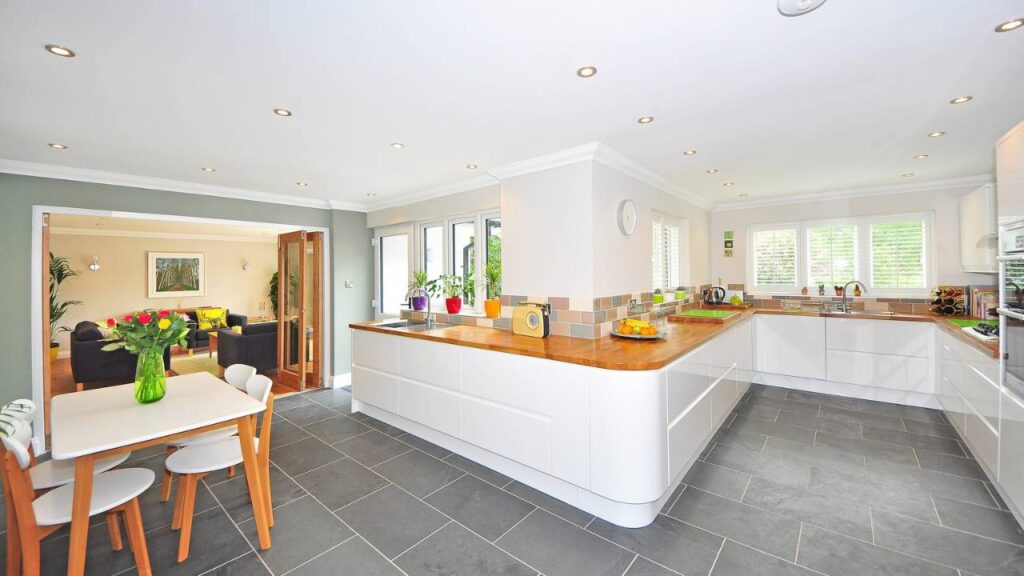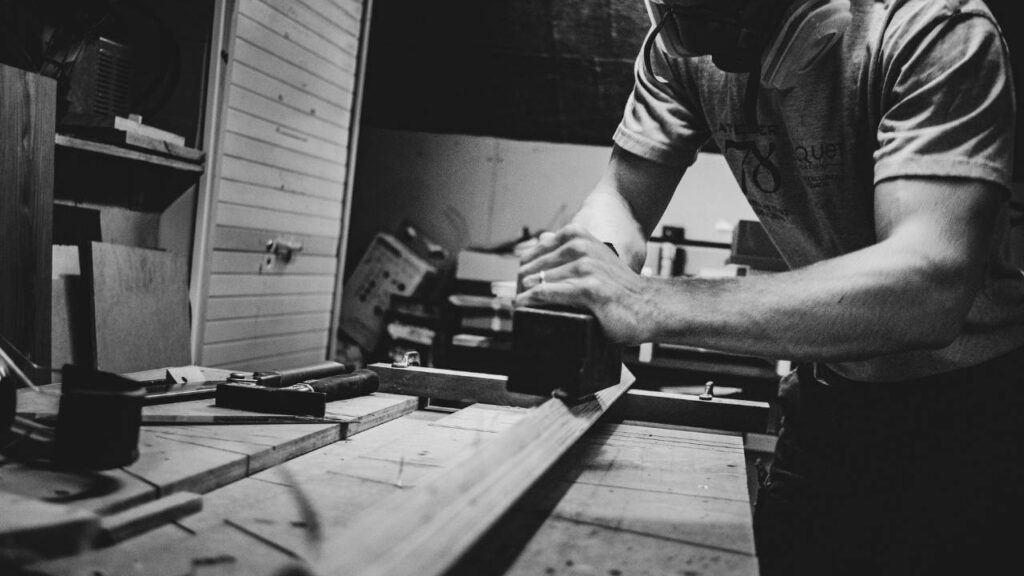
Crafting a kitchen that meets your unique needs has become a cornerstone of modern construction. Bespoke kitchens offer a personalised touch that standard kitchens simply can’t replicate. Whether you’re a culinary enthusiast or someone who enjoys hosting, a custom kitchen design elevates both functionality and style to new heights.
Incorporating bespoke elements into your kitchen allows for an unmatched level of customisation. From hand-picked materials to tailored layouts that optimise your space, these kitchens are designed to reflect your personal taste and lifestyle needs. You’ll find that each detail, no matter how small, contributes to an overall sense of harmony and efficiency.
Modern construction increasingly recognises the value of bespoke kitchens. They integrate seamlessly with contemporary architectural designs, offering not just a place to cook but a central hub for family life. Investing in a bespoke kitchen enhances the value of your home, merging tradition and innovation effortlessly.
The Essence of Bespoke Kitchen Design
Bespoke kitchen design focuses on customisation and individuality. Tailor-made kitchen solutions cater to your specific needs, allowing for a unique and functional space.
Understanding Bespoke Kitchens
A bespoke kitchen is created specifically for you, with every element made to measure. Unlike standard kitchens, which follow a one-size-fits-all approach, bespoke kitchens are designed from scratch. This means your kitchen layout, materials, and finishes are all chosen based on your preferences.
A bespoke kitchen might include unique cabinetry, personalised storage solutions, and custom-built appliances. Designers collaborate closely with you to ensure the kitchen reflects your lifestyle and taste. The emphasis is on quality craftsmanship and attention to detail, resulting in a space that’s truly your own.
Choosing a bespoke kitchen enables you to make the most of your available space. Whether your kitchen is large or small, bespoke design ensures every square inch is used effectively. This makes bespoke kitchens not just beautiful, but incredibly practical as well.
Advantages of Tailor-Made Kitchen Solutions
One significant advantage of tailor-made kitchen solutions is the ability to create a functional layout that suits your cooking style. You can place appliances exactly where you need them, ensuring efficiency and ease of use.
Tailor-made kitchens also offer unlimited design possibilities. You can select materials, colours, and finishes that complement the rest of your home, making your kitchen a cohesive part of your living space. Your choices are not confined to what’s available in showrooms or catalogues.
Customisation also extends to storage solutions, which can be designed to accommodate your specific needs. Whether you need deep drawers for pots and pans or specialised racks for spices, a bespoke kitchen can incorporate these features seamlessly.
Investing in a bespoke kitchen can add value to your home. Potential buyers appreciate the uniqueness and quality of tailor-made kitchens, making it a wise investment for the future.
Planning Your Dream Kitchen

Designing your dream kitchen requires a clear vision, thorough planning, and a realistic budget. Each step is crucial to ensure your kitchen meets your needs and preferences.
Starting with a Vision
Begin with a clear picture of how you want your kitchen to look and feel. Think about the style you prefer, whether it’s modern, traditional, or rustic. Consider the layout – do you want an open plan, an island in the centre, or perhaps a breakfast bar?
Identify your must-haves, such as high-end appliances, ample storage, or bespoke cabinetry. Collect inspiration from magazines, websites, or showrooms. This initial vision will guide all your decisions and keep you focused during the planning process.
Key Planning Considerations
When designing your dream kitchen, several key factors need attention. First, assess the space available and how you can maximise its functionality. Have a detailed design appointment to discuss your needs with a professional, who can help identify any potential issues and solutions.
Next, consider the materials and finishes. Opt for durable and easy-to-clean surfaces for a practical yet stylish kitchen. Pay attention to lighting – both natural and artificial – as it significantly impacts the room’s ambience and usability. Lastly, think about sustainability and energy efficiency in your choices, which can save costs in the long run.
Setting a Realistic Budget
Establishing a realistic budget is vital to prevent overspending. List all potential costs, including materials, labour, and appliances. Include a buffer for unexpected expenses to avoid financial stress during the project.
Prioritise your spending on what matters most to you, whether it’s high-quality countertops or state-of-the-art appliances. Keep track of your expenditures closely and adjust your plans if costs begin to exceed your budget. This approach ensures you achieve a fantastic kitchen without breaking the bank.
Designing for Functionality and Aesthetics
Balancing functionality and aesthetics in bespoke kitchens is crucial. It involves smart space utilisation, selecting appropriate appliances, and setting the right lighting and ambience for the cooking space.
Smart Space Utilisation
Effective use of space in a kitchen is vital to achieve both functionality and aesthetic appeal. Incorporating innovative storage solutions such as pull-out shelves and corner drawers maximises every inch of available space. Custom cabinetry, tailored to your kitchen’s exact dimensions, ensures no space is wasted. Efficient work triangles between the sink, hob, and refrigerator streamline kitchen workflows, making your cooking experience more enjoyable and less cluttered.
Choosing the Right Appliances
Selecting the right appliances entails more than just opting for the latest technology. It’s about choosing appliances that complement your kitchen’s design and meet your specific needs. Smart appliances, like refrigerators with touch screens and ovens with programmable settings, can significantly enhance functionality. Integrating these into the cabinetry keeps the space looking sleek and organised, ensuring that the kitchen remains a cohesive and stylish part of your home.
Lighting and Ambience
Lighting plays a key role in setting the kitchen’s ambience while ensuring practical needs are met. Layered lighting strategies, combining ambient, task, and accent lighting, can transform the kitchen into a multifunctional space. Under-cabinet lights illuminate countertops for food prep, pendant lights add style and character, and dimmable fixtures allow you to adjust the mood. The right combination of lighting can make your kitchen both a functional workspace and a warm, inviting place for family gatherings.
Materials and Finishes
Careful consideration of materials and finishes can elevate the design and functionality of your bespoke kitchen. Choosing the right countertops, cabinets, and hardware significantly impacts both aesthetics and durability.
Countertop Selection
Selecting countertops requires a balance between style and practicality. Granite and quartz are popular choices for their durability and luxurious appearance. Granite offers a unique and natural look, while quartz provides consistency and lower maintenance. Marble, known for its elegance, is a softer but higher-maintenance option.
Wooden countertops add warmth and can be customised with different stains and finishes. Stainless steel, commonly used in professional kitchens, offers a modern and clean look and is resistant to heat and stains. Each material has its own advantages, so consider your kitchen’s usage and your personal tastes.
Cabinet Materials and Styles
Cabinet materials range from solid wood like oak, maple, and cherry, to engineered options like MDF and plywood. Solid wood cabinets are celebrated for their durability and timeless appeal. MDF and plywood offer cost-effective alternatives with the benefit of being less prone to warping.
Styles can vary from sleek, contemporary lines to classic, ornate designs. Painted finishes provide a smooth appearance with nearly limitless colour options, while stained finishes highlight the natural beauty of the wood grain. Glass-fronted cabinets bring a more open and airy feel, allowing you to showcase your stylish dishware.
Hardware and Fixtures
Hardware and fixtures act as the jewellery of your kitchen, completing the look. Matte black and brushed gold finishes are trendy choices, providing a striking contrast to lighter cabinets and countertops. Stainless steel remains a popular choice for its modern appeal and durability.
Handles and knobs come in various shapes and sizes, influencing the kitchen’s overall aesthetic. Soft-close hinges on cabinets and drawers enhance the luxurious feel and functionality. Incorporating high-quality hardware not only adds to the visual appeal but also increases the longevity and user experience in your bespoke kitchen.
Collaboration with Professionals

Creating a bespoke kitchen involves various experts, from interior designers to 3D artists. Each professional brings a unique skill set to ensure your kitchen is both beautiful and functional.
Working with an Interior Designer
Interior designers are instrumental in realising your vision. By understanding your lifestyle and preferences, they tailor the kitchen’s design to fit seamlessly with the rest of your home. They help you choose the right materials, fixtures, and colour palette, ensuring a cohesive look.
Your interior designer will often have access to exclusive showrooms and design inspiration. These resources can provide fresh ideas and unique elements that you might not find elsewhere. Their expertise can transform a simple concept into a stunning reality, making your bespoke kitchen truly one of a kind.
The Craftspeople Behind Your Kitchen
Craftspeople are the backbone of any bespoke kitchen project. They bring the designer’s plans to life with precision and care. Skilled in cabinetry, woodworking, and custom installations, these artisans ensure every detail meets the highest standards.
Companies like JD Kitchens Dublin specialise in manufacturing and installing exquisite bespoke kitchens. Their team of craftsmen works diligently to create pieces that are not only functional but also works of art. The meticulous attention to detail and dedication to quality craftsmanship makes a significant difference in the final product.
Role of 3D Artists in Visualisation
3D artists play a crucial role in bringing your bespoke kitchen to life before any physical work begins. Using advanced software, they create realistic renderings that allow you to visualise how the final space will look. This step is vital for making informed decisions about layout, materials, and finishes.
These visualisations help bridge the gap between your ideas and the completed kitchen. They provide a clear picture of how different elements will come together, facilitating more effective communication and collaboration among all parties involved. Working with 3D artists ensures that the final outcome aligns closely with your expectations.
From the Workshop to Your Home
Bespoke kitchens transform from initial workshop designs to beautifully fitted kitchens in your home through a meticulous process involving custom building, precise installation, and thorough quality checks.
Custom Building Process
Your journey begins in a dedicated workshop where skilled craftsmen work meticulously on your bespoke kitchen. They will consider your unique preferences and specific requirements.
First, accurate measurements of your kitchen space are taken to ensure a perfect fit. Crafting your kitchen involves selecting high-quality materials that fit your style and needs. Each piece is cut, shaped, and assembled with precision. This phase demands attention to detail, as each unit must seamlessly integrate to form a cohesive whole.
Installation and Fitting
Once your bespoke kitchen has been crafted in the workshop, the installation process begins. Experienced fitters bring your custom pieces to your home, carefully positioning and securing them.
Installation requires precise placement to ensure everything aligns perfectly. Each unit, from cabinets to countertops, must be fitted and levelled correctly. The construction elements of your home, such as walls and floors, may require adjustments for a seamless fit. Expert fitters will check for issues like gaps or misalignments, ensuring a flawless finish.
Quality Checks and Aftercare
After installation, thorough quality checks are essential. The fitters will inspect each aspect of your kitchen, including the construction of units, alignment, and finishes.
This stage is vital to ensure everything meets high standards and functions smoothly. Handles, doors, drawers, and appliances are tested for proper operation. Once these checks are complete, any necessary adjustments are made.
You will receive aftercare instructions to maintain your bespoke kitchen, covering cleaning tips and solutions for potential issues. This ensures your custom kitchen continues to look and function beautifully for years to come.
Optimising Your Investment

Creating a bespoke kitchen is a significant investment that can bring both aesthetic pleasure and practical benefits. Wise planning ensures you balance costs while achieving long-term value and avoiding pitfalls.
Balancing Cost and Quality
Finding the right balance between cost and quality is crucial. While high-end materials and custom designs may elevate the appearance and functionality of your kitchen, they also increase the cost of a new kitchen. Choosing quality components that fit your budget while still providing durability can be a cost-effective strategy.
Engage with reputable suppliers who offer warranties. This helps in securing the best materials at reasonable prices, ensuring that you’re not only saving money upfront but also getting lasting value.
Long-Term Value of Bespoke Kitchens
Investing in a bespoke kitchen can significantly enhance your property’s value. Customised solutions often cater specifically to your needs, ensuring maximum utilisation of space and features that reflect your lifestyle. This investment can lead to a higher return on investment, especially if you plan to sell your home in the future.
The uniqueness of bespoke kitchens can make your home stand out in the market. Potential buyers appreciate thoughtful design and quality craftsmanship, often translating to competitive offers and quicker sales.
Avoiding Overcapitalisation
While it’s tempting to go all out with luxury elements, it’s important to consider the overall market value of your home. Overcapitalising can lead to spending more than you’ll regain in value. Research the average home values in your area before planning your budget.
Consult with real estate experts to understand the expected return on various levels of kitchen investment. This insight can help you avoid sinking too much money into features that won’t offer a proportional increase in your home’s market value. By staying within a sensible budget, you ensure your investment enhances your home value effectively.
Timeline and Project Management
Creating a bespoke kitchen requires careful planning and efficient project management to ensure everything runs smoothly. From understanding lead times to navigating the entire design to delivery journey, managing expectations and deadlines is crucial.
Understanding Lead Times
When embarking on a bespoke kitchen project, understanding lead times is essential. Lead times can vary significantly depending on materials, customisation needs, and supplier schedules. You might find that certain high-quality stones or exotic woods have longer procurement periods. Booking a design appointment early helps in estimating accurate timelines. Communicate with your project manager to account for these variables to avoid delays.
Navigating the Design to Delivery Journey
The journey from design to delivery involves several stages. Initially, you’ll have a design appointment where ideas are discussed and plans are drawn up. Once the design is finalised, the manufacturing process begins. This phase includes sourcing materials, which can take time based on availability. Regular updates from your project manager keep you informed of progress and any potential snags. Delivery and installation must be coordinated meticulously to fit within the set timeframe.
Managing Expectations and Deadlines
Managing expectations and deadlines is vital in a bespoke kitchen project. Clear communication from the start helps in setting realistic expectations regarding timelines. Discuss potential challenges with your project manager and develop a mitigation plan. Regular check-ins and updates ensure that you are always aware of the project’s status. By having a robust plan in place, you can anticipate and handle any issues that arise without exceeding deadlines.
Conclusion
Bespoke kitchens are undeniably significant in modern construction.
They cater to your unique preferences and lifestyle, offering a personalised touch that standard kitchens cannot match. This personalisation ensures that every corner and detail of your kitchen meets your specific needs and tastes.
Functionality is another key benefit. Bespoke kitchens are designed with your daily routines in mind, making your cooking and dining experiences more enjoyable and efficient.
Additionally, bespoke kitchens add value to your property. A well-crafted, uniquely designed kitchen can be a major selling point if you ever decide to sell your home.
Furthermore, the quality of materials and craftsmanship involved in bespoke kitchens often exceeds that of standard kitchen installations. This quality contributes to their longevity and durability.
In the end, investing in a bespoke kitchen is about more than just aesthetics. It’s about creating a functional, long-lasting space tailored to you and your family.